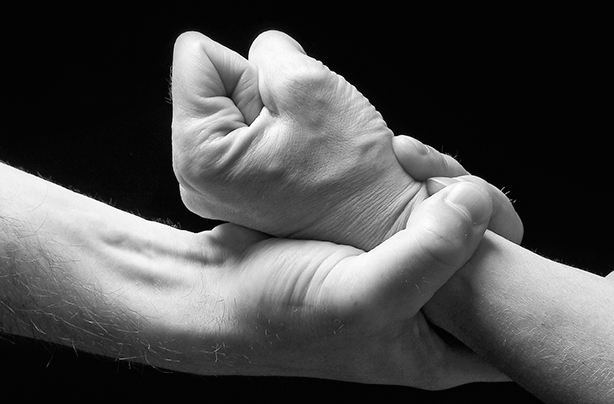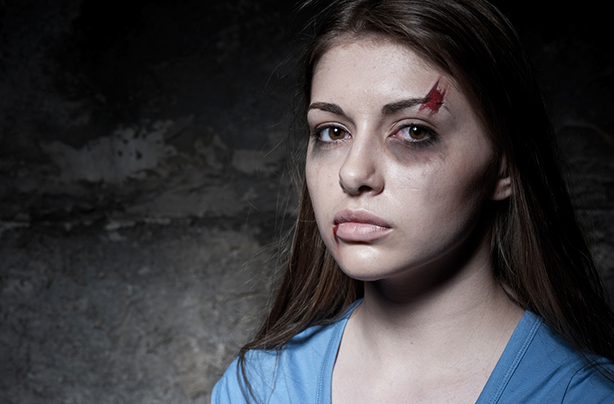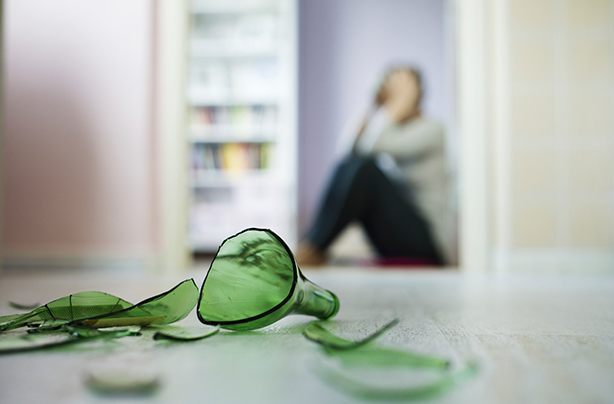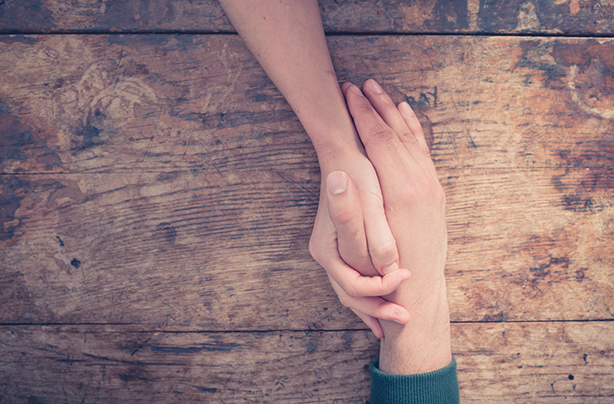Domestic violence: Everything you need to know
Would you know how to spot the signs?

Domestic violence affects 1 in 4 women and can be anything from verbal bullying to something much more physical. If you think you're at risk of domestic violence or want to help a friend, get the facts here.
Domestic abuse is about power and control, when one person exercises forceful power and control over his/her partner. It can be anything from being regularly shouted at and telling you that you are stupid, to them being violent towards you. Domestic abuse can be financial control, intimidating behaviour, threatening you, isolating you, rape and sexual assault or humiliation or physical violence.
Often it is very subtle and may start off as a one-off incident but this behaviour often becomes more frequent and severe and starts to form a pattern of controlling behaviour. It is usually men abusing women but some men suffer abuse from their female partners too. Children and pets often suffer as well and many experts have found a link between domestic abuse, child abuse and animal cruelty.
Recognising the signs of domestic abuse

Hidden behind closed doors, smiles and outward behaviour, domestic abuse suffered by our friends, family or work colleagues can often go unnoticed. At times we feel politeness dictates us not to pry into people's personal lives if we think there could be a problem and at other times things can go unnoticed simply because victims of domestic abuse often become experts at concealing their pain.
Sandra Horley, OBE, chief executive of domestic abuse charity Refuge says: 'Every week up to two women are killed by a current or former partner and 10 more commit suicide as their only way to escape abuse. That's a death toll of 12 women every week in the UK. That is not acceptable. We need to raise awareness of domestic violence.'
It may sound scary but recognising that someone you know may be suffering from domestic abuse could quite simply mean the difference between life and death. Often we rely on the victim to come forward and seek help, but in fact as the bystander we have a much more important role to play that many of us realise.
General domestic abuse warning signs in others
Domestic abuse - it's something we've all come to recognise in soaps, on the news and in the papers - but would you be able to spot the signs in someone you know?
GoodtoKnow Newsletter
Parenting advice, hot topics, best buys and family finance tips delivered straight to your inbox.
Victims of domestic abuse may:
- Seem increasingly more stressed, anxious or depressed. She might be more nervy and tense and be prone to tears and frustration. She may even reveal suicidal thoughts
- Go through personality changes - especially seeming jumpy and on edge when her partner is around. Her personality may even change when her partner isn't around and she may appear to be a completely different person
- Suffer from low self-esteem. She can be withdrawn, reluctant to speak and often will let her partner do all the talking. The partner may even talk down to her in front of others
- Stop socialising. She may make excuses about seeing her friends or family or just not turn up at social events
- Receive frequent phone calls, emails or unexpected visits from her partner
- Have regular physical injuries. Sometimes her explanations may seem vague or don't fit with the types of injuries suffered. She may make excuses and claim she's clumsy. She might also wear strange clothing designed to hide injuries - such as big jumpers in summer, or do her hair in a certain way to conceal parts of her face
- Have damaged property. If you visit her home, there may be signs of violence in broken, smashed or dented furniture
- Have no control over her own money. Her partner may take over her finances as a means to control her
Recognising domestic violence in your own relationship

Research by Refuge identified behaviour that may indicate domestic abuse. The aim of the behaviour, whether conscious or unconscious, is to take control of the woman's life. Domestic violence is an abuse of power - it's all about power and control. If you're worried, here are some questions to ask yourself:
- Is he jealous and possessive?
- Does he cut you off from family and friends and try to isolate you?
- Is he charming one minute and abusive the next, does he have sudden changes of mood?
- Does he control your life - for example money, who she should see, what you should wear?
- Does he monitor your movements?
- Does he blame you for the abuse?
- Does he humiliate or insult you in front of others?
- Does he verbally abuse you?
- Does he constantly criticise you?
- Does he use anger and intimidation to frighten you and to make you comply with his demands?
- Does he tell you you're useless and couldn't cope without him?
- Has he threatened to hurt you or people close to you if you leave?
- Do you change your behaviour to avoid making him angry and triggering an attack?
- Does he force you to have sex when you don't want to?
How domestic abuse affects women
Some people may think domestic violence is only when you can see a bruise or scar on a woman but abuse has many ways to harm someone. Some of these are:
- Cuts, bruises, scolds, broken bones or any sign of physical injury
- Mental illness such as depression, low self-esteem, stress disorders, self-harm
- Homelessness and poverty
- Drinking too much, over eating, under eating, taking drugs
- Suicide
- A child from a home where there is domestic violence will also suffer and can impact on them too. Some of the results are:
- Learning difficulties, having problems at school
- Depression, anxiety, stress
- Self-harm
- Isolation and bullying
- Taking drugs, drinking, over eating or under eating
- Difficulty making friends and sustaining relationships
What do if you think you're a victim of domestic violence
It's good that you have recognised the signs - that's the first step. Speak to a friend or relative that you trust and tell them what you've noticed and how it makes you feel. Make sure someone knows your fears and feelings - keeping quiet gives him more power over you and makes it harder for you to leave.
Depending on what form the abuse takes get specialist help from a charity like The National Domestic Violence Helpline on 0808 2000 247 who will be able to advise you on where to go for help. It might be helpful to speak to a marriage guidance counsellor, too, if you feel like you'd like to stay with your partner.
If you feel scared or threatened then you can also call the police on 999.
What to do if you think a friend is the victim of domestic violence

Speak up! It's better to ask than to brush your concerns under the carpet. Ask her in a tactful and gentle way and let her know you're there for her. Don't wait for her to come to you as she may find it hard to admit it to herself let alone you.
Listen to her. Once she's opening up to you, just listen to her and let her explain. Be calm and soothing, don't judge or criticise her. Share the things you're worried about and let her know you're there to support her. She doesn't need to be told what to do, she needs your help. Let her come to her own decisions and support them. It's a big step for her to admit there's a problem and she needs to come to terms with what's happening.
Don't confront her partner. This could make the situation far worse.
Seek professional help. If you're uncertain of what you can do to help, seek the support of a professional. At this point you don't necessarily need to tell the victim you're doing this, but it will help your peace of mind that you're offering her the right kind of support.
Getting help and leaving after domestic violence
Even if you think it's just been a nasty argument or it's the first time, tell someone, confide in a trustworthy friend or relative and get expert advice on what to do next. It might be that you need couples counselling or that you need to tell the police or and get medical help. Whatever has happened, even if you think it's not important or significant, let someone know and contact one of the helplines.
If your partner is violent, emotionally, sexually or verbally abusive your children and your pets are at risk too. And there are many studies to support a link in behaviour between adults who are abusive to children and animals and domestic abuse.
If your partner is being cruel to your children or to your pets you must tell someone you trust and inform the relative agency, such as the NSPCC or the RSPCA. Any information they have will support your case if you take your partner to court.
Following domestic abuse, here are some things you can do to get help:
Tell someone. Confide in a friend or relative and if possible get yourself out of the house or to wherever is a safe place for you and your family.
Look at the front of your local phone directory - they have helpline numbers, women's refuges, the local police station number and other useful numbers in an emergency. Copy these numbers and keep them in a safe place so you have them to hand whenever you need them.
Domestic violence charities are also very well equipped to advise and help whenever you need it.
You can call the confidential National Domestic Violence helpline free of charge 24 hours a day: 0808 2000 247.
What to do once you've made the decision to leave your partner Leaving your partner and possibly the family home is a very brave decision. With the right support you can do it - many women find they learn to live again and give their children a better future.
Before you go find somewhere safe to go, this could be a friend or relative or a women's refuge - if you have kids make sure it's ok to bring them too.
Get legal advice and ensure that you are safe and protected - this might mean changing the lock on your front door, informing the police of your partner's actions and whereabouts. If you have children inform their school and make sure that the teachers know who your partner is and if he has any legal access to your children.
Ensure you have access to people who can give you practical help, such as moving home, picking up the kids from school and people who can offer emotional and psychological support, such as a counsellor or domestic violence charity worker.
Sort out your finances. You will need your own money and having your own bank account will give you a bit of security and freedom.
If you are married you will need to consider divorce or separation, get legal advice on where you stand and what to do next.
The law on domestic violence
The police have a duty to protect all citizens, so if you are feeling threatened or fearful you must inform the police. A recent statement released from the Association of Chief Police Officers (ACPO) said, 'Violence against women in all its forms is unacceptable and ACPO is leading the police service in doing all it can to protect and support victims and to arrest perpetrators and put them before the courts. We urge victims to come forward so that we and other agencies can help them.
'For some time ACPO has been calling for more consistent partnerships between all the local agencies involved in tackling domestic abuse. In some areas the need for better information sharing between local government and partners is particularly acute so that the clearest possible picture of risk is available and acted on to assist police in preventing domestic abuse.'
Refuge suggest that if a woman feels frightened by her partner's shouting, that she's living her life on eggshells, that she never knows if her partner is going to be charming one minute or angry and aggressive the next, then it's likely that she's experiencing domestic violence. 'We'd encourage her to get in touch with Refuge to find out more about what she's experiencing and to speak to an expert who understands the techniques of an abusive man. There is a national domestic violence helpline 0808 2000 247 which is run in partnership with Refuge and Women's Aid and provides free, confidential support.'
Trusted, informative, and empathetic – GoodToKnow is the ultimate online destination for parents. At GoodtoKnow, our mission is 'simple': we're trying to make sense of parenthood. On the site, you'll find everything you need for a happy, healthy family life. Our huge archive of content includes more than 18,000 articles and 1,500 how-to videos. These include expert-backed advice features on parenting, dealing with relationship changes after having a baby, self-care for mums and managing your family finances. We also feature tried-and-tested product reviews and buying recommendations for every stage of family life - from prams and Moses baskets to birthday gifts and top toys.